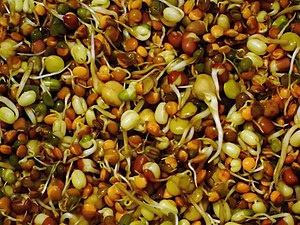Organic certification
From Wikipedia, the free encyclopedia
Organic certification is a certification process for producers of organic food and other organic agricultural products. In general, any business directly involved in food production can be certified, including seed suppliers, farmers, food processors,retailers and restaurants. Requirements vary from country to country, and generally involve a set of production standards for growing, storage, processing, packaging and shipping that include:
- avoidance of most synthetic chemical inputs (e.g. fertilizer, pesticides, antibiotics,food additives, etc), genetically modified organisms, irradiation, and the use ofsewage sludge;
- use of farmland that has been free from chemicals for a number of years (often, three or more);
- keeping detailed written production and sales records (audit trail);
- maintaining strict physical separation of organic products from non-certified products;
- undergoing periodic on-site inspections.
In some countries, certification is overseen by the government, and commercial use of the term organic is legally restricted. Certified organic producers are also subject to the same agricultural, food safety and other government regulations that apply to non-certified producers.
Contents[hide] |





No comments:
Post a Comment